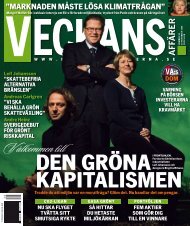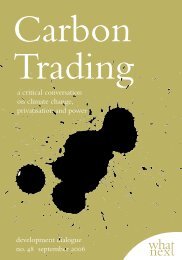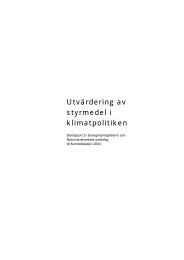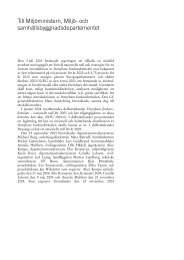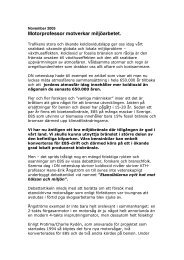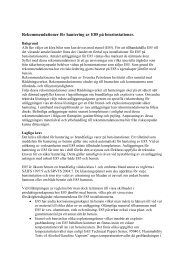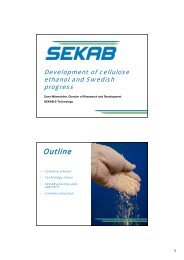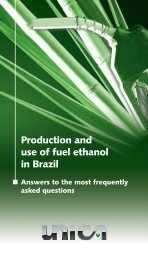Sugarcane ethanol: Contributions to climate change - BAFF
Sugarcane ethanol: Contributions to climate change - BAFF
Sugarcane ethanol: Contributions to climate change - BAFF
You also want an ePaper? Increase the reach of your titles
YUMPU automatically turns print PDFs into web optimized ePapers that Google loves.
Impacts of sugarcane bio<strong>ethanol</strong> <strong>to</strong>wards the Millennium Development Goals<br />
also constitutes an additional policy constraint. Pricing issues - whether <strong>to</strong> use bio<strong>ethanol</strong><br />
international price or its cost of production - can also a�ect industry development (Ra�<br />
Khan et al., 2007).<br />
All the above suggest the promotion of a sugarcane bio<strong>ethanol</strong> industry can become very<br />
expensive, not only due <strong>to</strong> the high up front investments that are required but also due <strong>to</strong><br />
the �nancial resources that are needed <strong>to</strong> make it viable in the long term.<br />
From a poverty reduction strategy point of view this means that governments should design<br />
their sugarcane bio<strong>ethanol</strong> policies so as <strong>to</strong> reach the desired target group. As ESMAP (2005b)<br />
notes, resources that �ow <strong>to</strong> agriculture all <strong>to</strong>o o�en bene�t politically powerful, large<br />
producers and modern enterprises disproportionately at the expense not only of the society as<br />
a whole, but of those that are supposed <strong>to</strong> be the main bene�ciary group: smallholder farmers<br />
and landless workers. Examples include untargeted producer subsidies and dis<strong>to</strong>rtionary<br />
subsidies for privately used inputs such as water and electricity. According <strong>to</strong> the same source,<br />
promoting biofuels for energy diversi�cation can make sense if large government subsidies<br />
are not required. However, UN-Energy (2007) holds the view that if the large subsidies are<br />
targeting small producers this may be money well spent. Governments tend <strong>to</strong> get higher<br />
returns on their public spending by fostering small-scale production due <strong>to</strong> the lowered<br />
demand for social welfare spending and greater economic multiplier e�ects.<br />
Overall, governments need <strong>to</strong> conduct a careful assessment of the pros and cons of promoting<br />
sugarcane bio<strong>ethanol</strong> <strong>to</strong> support poor rural communities versus those of other alternatives.<br />
Similarly, from a <strong>climate</strong> <strong>change</strong> mitigation strategy, although sugarcane bio<strong>ethanol</strong> may<br />
show the greatest greenhouse reductions compared <strong>to</strong> other �rst generation feeds<strong>to</strong>cks, these<br />
should be assessed against the costs of other policy instruments <strong>to</strong> achieve the same goal.<br />
3.7. Market access and market entry barriers<br />
�e strategic nature of bio<strong>ethanol</strong> implies the existence of some degree of protectionism in<br />
almost any producing country. Protectionism is especially acute where energy security is<br />
equated with self-su�ciency or where biofuels are promoted <strong>to</strong> help domestic farmers in<br />
high-cost producing countries (Dufey et al., 2007b). �e use of tari�s <strong>to</strong> protect domestic<br />
biofuel industries is a common practice and, as Table 1 shows, these can be very high.<br />
However, these tari�s are only indicative as their actual level applied vary widely as both<br />
the European Union and the United States have trade agreements providing preferential<br />
market access <strong>to</strong> several developing countries. In particular, the extra US$ 0.14 <strong>to</strong> each litre<br />
(US$ 0.54 per gallon) of imported bio<strong>ethanol</strong> on <strong>to</strong>p of the 2.5 percent tari� applied by the<br />
United States, it is said <strong>to</strong> be targeting Brazilian imports as it brings the cost of Brazilian<br />
bio<strong>ethanol</strong> in line with that produced domestically (Severinghaus, 2005). Tari� escalation,<br />
which discriminates against the �nal product, can also be an issue, for example, where there<br />
are di�erentiated tari�s on bio<strong>ethanol</strong> and feeds<strong>to</strong>ck such as raw molasses (Dufey, 2006).<br />
<strong>Sugarcane</strong> <strong>ethanol</strong> 217



